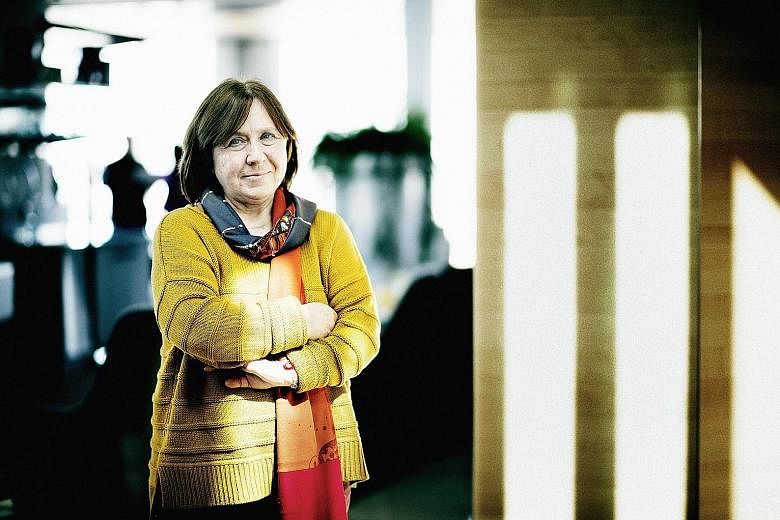GOTHENBURG, SWEDEN • Belarusian writer Svetlana Alexievich said she had spent her life asking one big and - very Russian - question: Why doesn't people's suffering translate into freedom?
It is a question that lies at the heart of her five encyclopaedic volumes of oral history of post-war Russia. When she won the Nobel Prize in Literature last year, those books were barely known in the English-speaking world.
That is starting to change. Next week, Random House is releasing Secondhand Time: The Last Of The Soviets, her 2013 oral history of post-Soviet Russia, in English translation for the first time, to be followed by two more of her books by 2018.
Already hailed as a masterpiece across Europe, Secondhand Time is an intimate portrait of a country yearning for meaning after the sudden lurch from communism to capitalism in the 1990s plunged it into an existential crisis.
A series of monologues by people across the former Soviet empire, it is Tolstoyan in scope, driven by the idea that history is made not only by major players, but also by ordinary people. The book makes clear how President Vladimir Putin manages to hold his grip on a country of 143 million people across 11 time zones.
"In the West, people demonise Putin," Alexievich, who turns 68 later this month, said in a recent interview in Sweden, speaking Russian through a translator after a conference on her work at the University of Gothenburg.
"They do not understand that there is a collective Putin, consisting of millions of people who do not want to be humiliated by the West," she added. Not that she is a fan. On the contrary, after winning the Nobel Prize in October, she said in a daring news conference in Minsk, Belarus, that she loved the Russian world of the humanities but not the Russian world "of Stalin or Putin".
Secondhand Time includes testimonies by friends and family of a teenage suicide, a one-time Kremlin official, Gulag survivors, witnesses to ethnic sectarian violence in the Caucasus, anti-government demonstrators in Moscow and Belarus, and a Tajik labourer.
"Russians don't just want to live," one person says in the book. "They want to live for something."
There is plenty of misery, but there are also jokes.
Bela Shayevich, the English translator, said Secondhand Time was "an update of 19th-century Russian literature for the 21st century".
People read Russian novels not for the happy endings, she added, but "because there is great catharsis in great pain and then something that is sublime".
Secondhand Time is Alexievich's fifth book. Her first, War's Unwomanly Face (1985, with an expanded edition in 2002), was about Russian women who had combat roles in World War II, only to return home to be shunned. Random House is to release it next year in a translation by Richard Pevear and Larissa Volokhonsky, whose work has breathed new life into Russian classics. In 2018, Random House will release the couple's translation of The Last Witnesses, Alexievich's 1985 book on the memories of Russians who were children during World War II. When it appeared in the 1980s, War's Unwomanly Face caught the attention and praise of Mikhail Gorbachev, then the Soviet leader. A few years ago, Alexievich met him for the first time. "He said, 'You're so small, how can you write such big books?'" she recalled with a smile. "You are not a giant either," she said she told him. "But you could destroy an empire."
NEW YORK TIMES
•Secondhand Time: The Last Of The Soviets (US$17.85 or S$24.65) can be pre-ordered at Amazon.com

